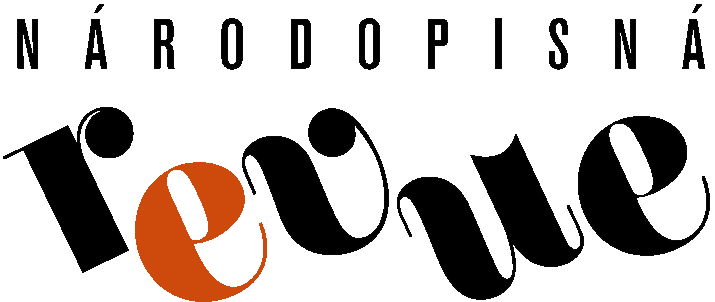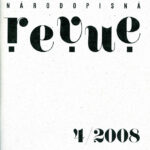Journal of Ethnology 4/2008 deals with folklorism and utilization of folk traditions in the social and political context. Martina Pavlicová and Lucie Uhlíková in their study pay attention especially to the Czech folklore movement in the period of real socialism (Folklorism in historical context of the years 1945-1989 (following the example of the folklore movement in the Czech Republic). Klára Davidová deals with a specific ensemble, studying it as an alternative social community of that time (Chorea Bohemica - a folk dance ensemble as a site of inner emigration). Oľga Danglová focuses on the Slovak environment and reflection of folk traditions in politics (Folk Traditions and Politics). Juraj Hamar analyzes the development of stage folklore in Slovakia in the last twenty years (Folklore in the shadow of scenic folklorism. Marginalia to the Slovak folklore movement after the year 1988-2008). Jan Blahůšek assesses the work of a significant personality in the field of utilization and development of music traditions (The personality of Jaromír Nečas from the point of view of musical folkloristics).
Stopping with Photos section remembers the personality of Josef Šíma who dealt with folk culture at the turn of the 19th and 20th centuries (by Helena Beránková). Transferring Tradition column publishes the contribution by Eva Večerková Czech Republic Christmas Tree. Notes on Modern Tradition, then the reflections on the dance “verbuňk” called Intangible Cultural Heritage by Barbora Čumpelíková and the contribution Contemplation on the 100th anniversary of Slovácký krůžek in Brno by Václav Štěpánek. Section Review remembers Emanuel Kuksa (1932-2003), a composer, musical manager and teacher who was closely connected with folklorism. Section Interview introduces ethnologist Bohuslav Šalanda on his anniversary. Social Chronicle remembers the anniversaries of ethnologists Jiří Pajer (born 1948) and Vlasta Ondrušová (born 1948). Other regular columns publish the reviews of new book editions, the reports of folklore festivals, conferences and activities of the National Institute of Folk Culture in Strážnice.
Folklorism in historical context of the years 1945–1989 (following the example of the folklore movement in the Czech Republic)
Folklorism as the phenomenon and the movement was defined and studied for many times in the ethnological literature, for example with the respect to its role it played in the cultural and historical development of the society and in the process of national, regional and local identification; or with the respect to its role in upbringing the youngest generation. The submitted contribution refers to folklorism in a concrete sector of the folklore movement, asking the question how it functions as a part of the contemporary culture and which role it can play in the life of an individual. It was more difficult to find an answer in past periods. Since it came into being, this range of culture was connected and evaluated in connections with the political context of that time. A specific framework was created especially between 1945 and 1989. The impact of social processes of that time in other cultural spheres has been reflected for many times (e.g. literature, film, religious life). However, the sphere of the folklore movement is always awaiting an objective assessment. There should be investigated not only the impact of the society on this movement, but also the personal statements of the persons involved, which completes the study of life in the period of real socialism.
Chorea Bohemica – a folk dance ensemble as a site of inner emigration
The study deals with the Chorea Bohemica ensemble from the dance-anthropologic point of view. The aim is to describe the ensemble in its social and cultural aspects and to explore the relation between the importance the Chorea Bohemica members placed on their participating in the group and the political situation in communist Czechoslovakia of that time. The presumption is that the ensemble served as a site for ‘inner emigration’ (a kind of getaway from an oppressive reality of the communist regime). The investigation could show that Chorea Bohemica provided a space for inner emigration. Moreover, it transcended the private character of the usual ‘inner emigration-like’ activities to the public realm and allowed free and creative self-expression, which at some points took on a meaning of an active resistance to the communist regime. The investigation of the factors that constituted the socio-cultural environment of the ensemble was therefore crucial for understanding both the Chorea Bohemica output and the importance it had for its members.
Folk Traditions and Politics
The contribution points out the changeable relationship between cultural heritage and politics in the historical retrospective. It draws the attention to the fact how the aestheticity of folk traditions became a part of the Slovak nation institutionalization in the cultural and political sense in the 19th century nation-creating thoughts; how some folk traditions became a source for creation of the national culture and a mean for political propaganda and manipulation between the Wars and in the period of Slovak military state; how the socialistic state policy supported the folk traditions, appreciating them as an expression of working class. The above was one of the reasons why folklore lost its credit at a part of Slovak meaning-creating society in the post- socialistic period. On the other hand, even present Slovak politicians like to draw on folklore heritage, trying to use it for putting-through their political projects.
Folklore in the shadow of scenic folklorism. Marginalia to the Slovak folklore movement after the year 1988
After the World War II, folklore lost its functions that proceeded on the original environment and original opportunities. Its so-called “secondary existence” in the form of stage folklorism is always more actual. At the end of the 1940s, there were founded two important folklore ensembles that dealt with stage arrangements and interpretation of folklore on professional level – Lúčnica (1948) and Slovenský ľudový umelecký kolektív (SĽUK – Slovak Traditional Dance Theatre, 1949). For decades, both bodies were influencing the establishment and activities of amateur folklore ensembles all over Slovakia. In 1988, the Slovak folklore movement was a well-functioning organism with the hinterland at many institutions and with the carefully formulated methodology for care, protection, up-bringing and education in the field of stage folklorism. The social changes at the end of 1989 brought a lot of negative experience in the Slovak folklore movement. In addition to the difficulties with financial support for ensembles and festivals, there appeared especially the stereotypes focused on folklore discrediting. Such stereotypes found their breeding ground mainly in mass media. The folklore works, in which we can see the propensity for poor taste and kitsch, constitute another problem. In the end, it is also the institutional failure of the methodological centre for stage folklorism in Slovakia.
The personality of Jaromír Nečas from the point of view of musical folkloristic
The essay deals with the role of an individual in the development of folklorism in the Czech Republic, namely with Jaromír Nečas, a significant personality of the post-war cultural life in Moravia. As the music editor at the Czechoslovak Radio (Czech Radio today), since 1952 he had taken part in documentation and modern passing-on of music folklore and folklore expressions, their presentation and popularization. Significant was his cooperation with the Brno Radio Orchestra of Folk Instruments where he worked as cimbalom-player, arranger and Artistic Council member. Nečas´s activity, however, fell outside the scope of the Radio – he lectured on ethnomusicology and folk music culture at important music schools in Brno, taught playing the cimbalom, cooperated with plenty of folk music bands as their consultant; he was initiator, music manager or co-publisher of music media with records of folk music. Jaromír Nečas´s knowledge of folklore material and its exponents and his always-functioning intuition of a music editor, who tries to involve the audience in the imaginary middle of musical events, made him an important co-operator of folklore festivals. The essay is considered the folkloristic assessment of the life’s direction and contribution of this personality.



